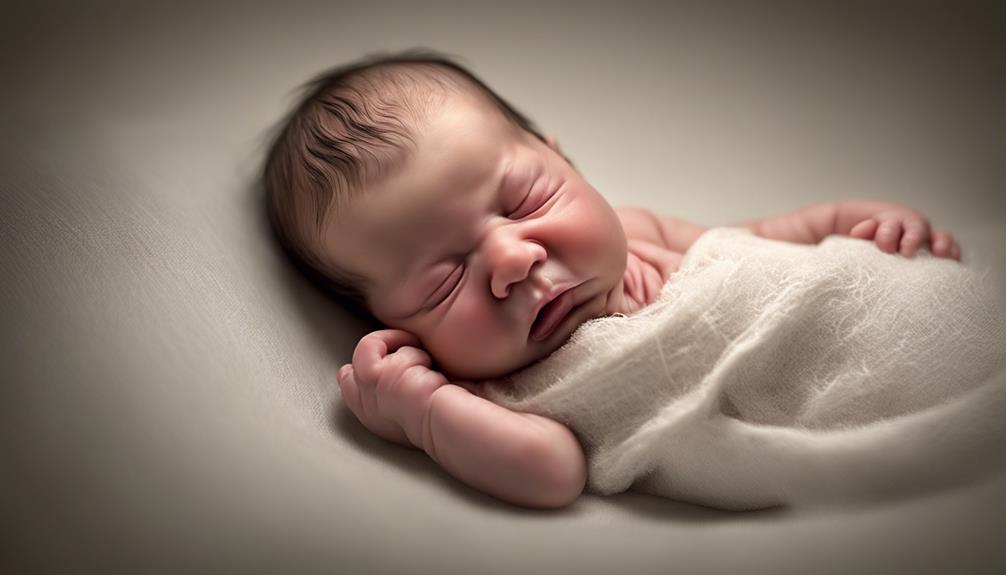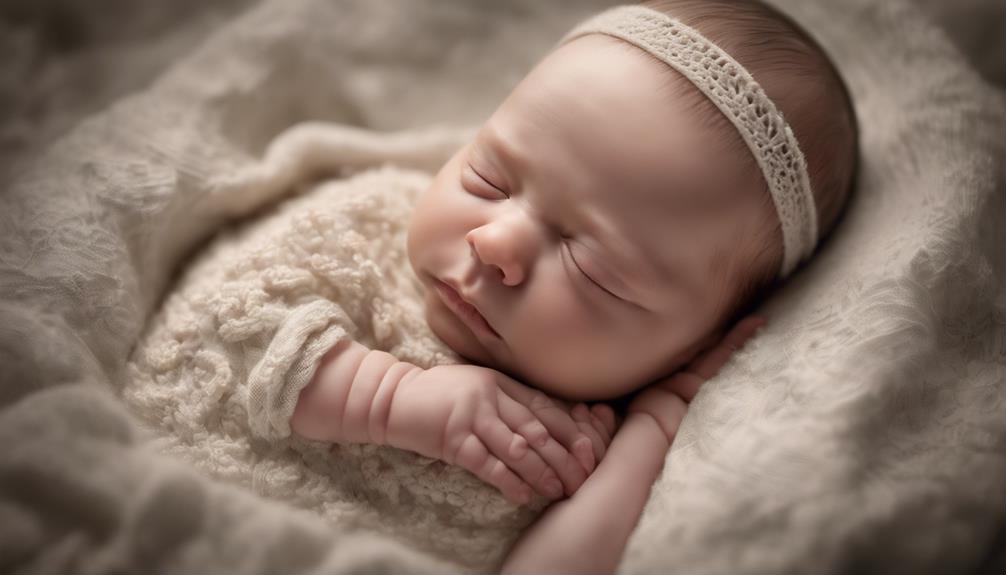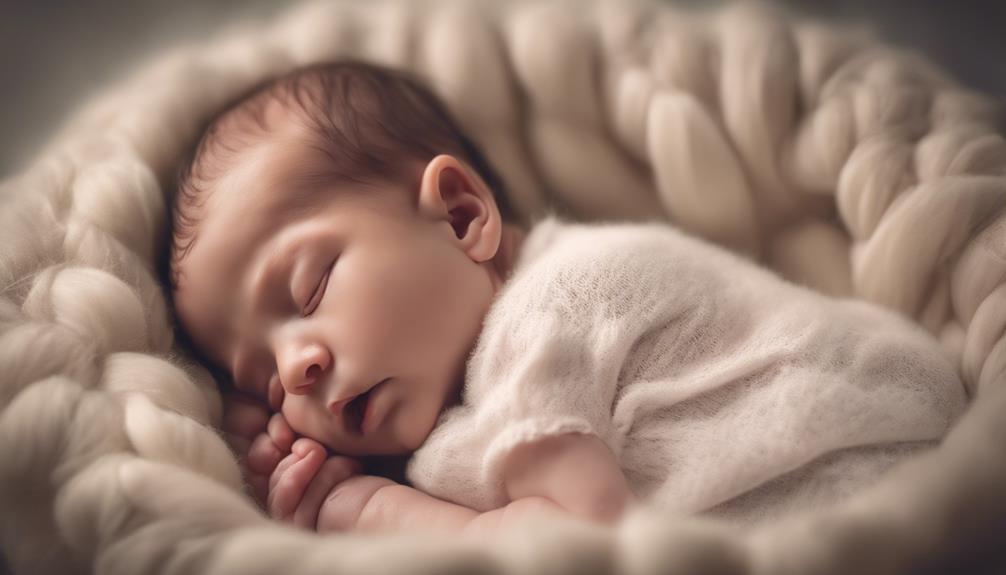As new parents, we might wonder if decoding our newborn's sleep cues is simply a guessing game. However, understanding these subtle signals is key to creating a well-rested environment for your little one.
Have you ever found yourself unsure if your baby is tired or just fussy? It's a common dilemma many parents face, but with a bit of insight into sleep cues, you can navigate this challenge more confidently.
Let's explore how recognizing these cues can lead to better sleep patterns and a happier baby.
Key Takeaways
- Understanding newborn sleep cues prevents overtiredness and helps settle babies into sleep.
- Recognizing signs of sleepiness through yawning, eye rubbing, and fussiness is crucial.
- Distinguishing sleep cues by age aids in adjusting sleep routines and supporting evolving sleep needs.
- Creating a soothing sleep environment and establishing a consistent bedtime routine are essential for better sleep quality.
Understanding Newborn Sleep Cues
Recognizing and responding to newborn sleep cues is essential for establishing healthy sleep habits and preventing overtiredness in infants. Newborns communicate their need for rest through subtle signs like yawning, rubbing their eyes, fussiness, reduced activity, and avoiding eye contact. By understanding these cues, parents can help settle babies into sleep without disruptions in their bedtime routines.
When we miss these important signals, it can lead to difficulties in sleep patterns, affecting both daytime naps and nighttime sleep. This, in turn, can impact a baby's mood, behavior, and attention span. Paying attention to these cues not only helps prevent overtiredness but also readies babies for much-needed rest and ensures they're prepared for sleep when it's time.
Recognizing Signs of Sleepiness

When your newborn starts yawning, rubbing their eyes, or showing decreased activity levels, it's important to pay attention as these are clear indicators of sleepiness. Recognizing these signs of sleepiness in your baby is vital for ensuring they get the rest they need. By observing and understanding your newborn's sleepy cues, you can prevent overtiredness and promote better sleep quality for them. Responding promptly to these signals can lead to improved overall well-being and a happier, more well-rested baby.
| Signs of Sleepiness | Description |
|---|---|
| Yawning | A common indicator of fatigue in newborns. |
| Rubbing Eyes | Shows that your baby is getting sleepy. |
| Decreased Activity | Your baby may become less active as they get tired. |
| Fussiness | Increased irritability can also signal sleepiness. |
Differentiating Sleep Cues by Age

As newborns grow and develop, their sleep cues evolve, requiring parents to differentiate between various signals based on their age. Newborn babies sleep cues often include staring blankly, turning face away, yawning, stretching, rubbing eyes, pulling ears, and arching back. These cues are essential markers of when your newborn is ready for sleep.
As babies age, their sleepy signals may shift towards clinginess, clumsiness, demanding attention, fussiness when eating, and crying. Understanding these changes in sleepy cues is important for adjusting sleep routines to meet your baby's evolving needs.
Recognizing and responding to these sleepy cues are fundamental steps in establishing a healthy sleep routine from the early stages. By being attuned to your baby's individual sleep patterns and age-appropriate wake windows, you can create a tailored sleep environment that supports their best rest and development.
Creating a Soothing Sleep Environment

To create a soothing sleep environment for your newborn, confirm the space is comfortable and safe. Choose soft, breathable bedding and make sure the room temperature is just right.
Consider using white noise machines or playing gentle music to create a calming atmosphere for sleep. Dim the lights in the evening to signal to your baby that it's time to wind down and prepare for rest.
It's important to avoid overstimulation in the sleep environment by keeping distractions to a minimum. By setting up a safe sleep environment with these cues in mind, you can help your baby feel secure and ready for a good night's sleep.
Establishing a Bedtime Routine

Establishing a bedtime routine is a key element in helping your newborn understand when it's time to settle down and rest for the night. Consistency is key when it comes to bedtime routines for your baby. By following a set pattern each night, you can help signal to your little one that sleep is approaching.
Introducing calming activities such as a warm bath or gentle rocking can prepare your baby for bedtime, making the shift to sleep smoother. Creating a sleep-friendly environment by dimming lights and reducing stimulation in the evening can further aid in promoting a restful night for your newborn.
Incorporating soothing cues like reading a bedtime story or singing a lullaby can also help your baby wind down and prepare for sleep. Remember, establishing a predictable bedtime routine not only helps your baby feel secure but can also lead to better sleep quality and overall well-being.
Conclusion
To sum up, decoding sleep cues in your newborn is like reading a story written just for them. By paying attention to their unique signals, you can create a bedtime routine that sets the stage for restful nights and peaceful days.
Just like deciphering a secret code, understanding your baby's sleepy cues will reveal the key to a well-rested and happy little one. So, keep observing, keep learning, and watch your baby thrive with the gift of good sleep.









